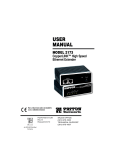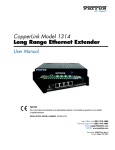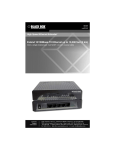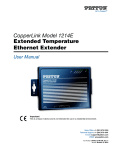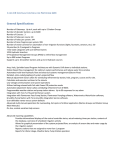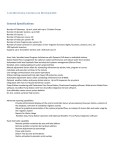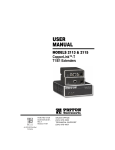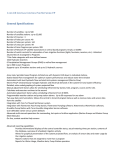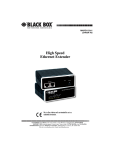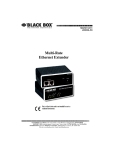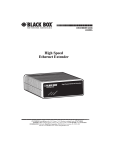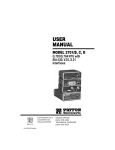Download Patton 2174 User Manual
Transcript
USER MANUAL MODEL 2174 CopperLINK™ High Speed Ethernet Extender REGULATORY MODEL NUMBER: 03342D4-001 This is a Class A device and is not intended for use in a residential environment. Part# 07M2174-UM Rev. C Revised 11/8/11 An ISO-9001Certified Company SALES OFFICE (301) 975-1000 TECHNICAL SUPPORT (301) 975-1007 CONTENTS 1.0 1.1 1.2 1.3 1.4 1.5 1.6 Warranty Information ................................................................. Regulatory Information ................................................................. EMC Directive:.............................................................................. Low-Voltage Direcive (Safety): ..................................................... PSTN: ........................................................................................... Radio and TV Interference (FCC Part 15) .................................... CE Declaration of Conformity ....................................................... Authorized European Representative........................................... Service.......................................................................................... Safety When Working With Electricity .......................................... 2.0 2.1 2.2 General Information.................................................................... 8 Features........................................................................................ 8 Description.................................................................................... 8 3.0 3.1 Installation................................................................................... 9 Connecting the Line Interface..................................................... 11 Connecting the Line Interface for Model 2174/EUI or 2174/TB.. 11 Connecting the Line Interface for Model 2174/BNC ................... 12 Connecting the 10/100Base-T Ethernet Interface ...................... 12 Connecting Power ...................................................................... 13 3.2 3.3 4 4 4 4 4 4 5 5 5 6 4.0 4.1 4.2 Configuration ............................................................................ Configuring the Hardware DIP switches ..................................... Configuring DIP Switch S1 ......................................................... Switch S1-1: Local/Remote Configuration.................................. Switches S1-2 and S1-3: Symmetric/Asymmetric Operation ..... Switch S1-5: General Protection (Signal to Noise Ratio) ........... 13 13 14 15 15 15 5.0 5.1 Operation................................................................................... 16 Front Panel LED Status Monitors ............................................... 16 A A.1 A.2 A.3 A.4 A.5 A.6 A.7 A.8 Specifications ........................................................................... 17 LAN Connection ......................................................................... 17 Transmission Line ....................................................................... 17 CopperLINK Line Rate and CopperLINK Distance .................... 17 LED Status Indicators ................................................................. 17 Power Supply .............................................................................. 17 Temperature Range .................................................................... 17 Humidity ...................................................................................... 17 Dimensions ................................................................................. 17 B Model 2174 Series Factory Replacement Parts and Accessories...................................... 18 C Model 2174 Series Interface Pin Assignment ........................ 19 C.1 10/100Base-T Interface .............................................................. 19 2 RJ-45 .......................................................................................... 19 C.2 CopperLINK Interface ................................................................ 19 RJ-45 .......................................................................................... 19 Terminal Block............................................................................ 19 D Line Rate & Reach Chart, Based on 24 AWG (0.5 MM) ......... 20 3 1.0 WARRANTY INFORMATION Patton Electronics warrants all Model 2174 components to be free from defects, and will—at our option—repair or replace the product should it fail within one year from the first date of the shipment. This warranty is limited to defects in workmanship or materials, and does not cover customer damage, abuse or unauthorized modification. If this product fails or does not performs as warranted, your sole recourse shall be repair or replacement as described above. Under no condition shall Patton Electronics be liable for any damages incurred by the use of this product. These damages include, but are not limited to, the following: lost profits, lost savings and incidental or consequential damages arising from the use of or inability to use this product. Patton Electronics specifically disclaims all other warranties, expressed or implied, and the installation or use of this product shall be deemed an acceptance of these terms by the user. Note Conformity documents of all Patton products can be viewed online at www.patton.com under the appropriate product page. 1.1 REGULATORY INFORMATION EMC Directive: • FCC Part 15, Class A • EN55022, Class A • EN55024 • A-tick Low-Voltage Direcive (Safety): • IEC/EN60950-1, 2nd Edition • AS/NZS 60950-1, A-tick PSTN: • This device is not intended nor approved for connection to the PSTN 1.2 RADIO AND TV INTERFERENCE (FCC PART 15) This device generates and uses radio frequency energy, and if not installed and used properly-that is, in strict accordance with the manufacturer’s instructions-may cause interference to radio and television recep4 tion. The device has been tested and found to comply with the limits for a Class A computing device in accordance with specifications in Subpart B of Part 15 of FCC rules, which are designed to provide reasonable protection from such interference in a commercial installation. However, there is no guarantee that interference will not occur in a particular installation. If the device does cause interference to radio or television reception, which can be determined by disconnecting the unit, the user is encouraged to try to correct the interference by one or more of the following measures: moving the computing equipment away from the receiver, re-orienting the receiving antenna and/or plugging the receiving equipment into a different AC outlet (such that the computing equipment and receiver are on different branches). 1.3 CE DECLARATION OF CONFORMITY Patton Electronics, Inc declares that this device is in compliance with the essential requirements and other relevant provisions of Directive 2004/108/EC relating to electromagnetic compatibility and Directive 2006/95/EC relating to electrical equipment designed for use within certain voltage limits. The Declaration of Conformity may be obtained from Patton Electronics, Inc at www.patton.com/certifications. The safety advice in the documentation accompanying this device shall be obeyed. The conformity to the above directive is indicated by CE mark on the device. 1.4 AUTHORIZED EUROPEAN REPRESENTATIVE D R M Green European Compliance Services Limited. Avalon House, Marcham Road Abingdon, Oxon OX14 1UD, UK 1.5 SERVICE All warranty and non-warranty repairs must be returned freight prepaid and insured to Patton Electronics. All returns must have a Return Materials Authorization number on the outside of the shipping container. This number may be obtained from Patton Electronics Technical Services at: • Tel: +1 (301) 975-1007 • Email: [email protected] • URL: http://www.patton.com Note Packages received without an RMA number will not be accepted. 5 1.6 SAFETY WHEN WORKING WITH ELECTRICITY • This device contains no user serviceable parts. This device can only be repaired by qualified service personnel. • Do not open the device when the power cord is connected. For systems without a power switch and without an external power adapter, line voltages are present within the device when the power cord is connected. • For devices with an external power adapter, the power adapter shall be a listed Limited Power Source. The mains outlet that is utilized to power the device shall be within 10 feet (3 meters) of the device, shall be easily accessible, and protected by a circuit breaker in compliance with local regulatory requirements. • For AC powered devices, ensure that the power cable used meets all applicable standards for the country in which it is to be installed. WARNING • For AC powered devices which have 3 conductor power plugs (L1, L2 & GND or Hot, Neutral & Safety/Protective Ground), the wall outlet (or socket) must have an earth ground. • For DC powered devices, ensure that the interconnecting cables are rated for proper voltage, current, anticipated temperature, flammability, and mechanical serviceability. • WAN, LAN & PSTN ports (connections) may have hazardous voltages present regardless of whether the device is powered ON or OFF. PSTN relates to interfaces such as telephone lines, FXS, FXO, DSL, xDSL, T1, E1, ISDN, Voice, etc. These are known as “hazardous network voltages” and to avoid electric shock use caution when working near these ports. When disconnecting cables for these ports, detach the far end connection first. • Do not work on the device or connect or disconnect cables during periods of lightning activity. 6 In accordance with the requirements of council directive 2002/96/EC on Waste of Electrical and Electronic Equipment (WEEE), ensure that at end-of-life you separate this product from other waste and scrap and deliver to the WEEE collection system in your country for recycling. WARNING WARNING This device contains no user serviceable parts. This device can only be repaired by qualified service personnel. This device is NOT intended nor approved for connection to the PSTN. It is intended only for connection to customer premise equipment. Electrostatic Discharge (ESD) can damage equipment and impair electrical circuitry. It occurs when electronic printed circuit cards are improperly handled and can result in complete or intermittent failures. Do the following to prevent ESD: • Always follow ESD prevention procedures when removing and replacing cards. WARNING • Wear an ESD-preventive wrist strap, ensuring that it makes good skin contact. Connect the clip to an unpainted surface of the chassis frame to safely channel unwanted ESD voltages to ground. • To properly guard against ESD damage and shocks, the wrist strap and cord must operate effectively. If no wrist strap is available, ground yourself by touching the metal part of the chassis. 7 2.0 GENERAL INFORMATION Thank you for your purchase of this Patton Electronics product. This product has been thoroughly inspected and tested and is warranted for one year for parts and labor. If any questions or problems arise during installation or use of this product, contact Patton Electronics Technical Support at +1 (301) 975-1007. 2.1 FEATURES • Variable rate CopperLINK extender - Easy to configure • Auto-MDIX Ethernet • Configurable 10/100, Full/Half, and Auto-Negotiating Ethernet • Extends up to 4x 10/100Base-TX Ethernet beyond 328-foot (100meter) limitation over a single twisted-pair, Cat 5e/6/7, or coaxial cable • Symmetric or asymmetric settings via DIP switch • Transparent operation • LED indicators for Power, DSL Link, Ethernet Link/Activity, Remote and Local 2.2 DESCRIPTION The Patton Electronics Model 2174 CopperLink modems provide highspeed LAN connections between peered Ethernet LANs, remote PCs, or any other network-enabled 10/100Base-T device. Operating in pairs, one Model 2174 is configured as the (L) Local unit located at one end of the LAN extension and the other Model 2174 is configured as the (R) Remote unit at the other end. The Model 2174 is configured as a L or R via the switch on the bottom of the unit. These units can automatically forward LAN broadcasts, multicasts, and frames across a 2wire voice-grade twisted-pair or BNC link. The data is passed transparently (unmodified) through the 2174s. The 2174s automatically add and delete MAC addresses, only passing packets across the CopperLINK link that are meant for the remote peered LAN. 8 Figure 1. Typical application The pair of 2174 models work together to create a transparent extension between two peered Ethernet LANs using twisted pair (2-wire), Cat5+, or 75-ohm BNC. Figure 1 shows a typical point-to-point application. 3.0 INSTALLATION CAUTION The Interconnecting cables shall be acceptable for external use and shall be rated for the proper application with respect to voltage, current, anticipated temperature, flammability, and mechanical serviceability. To install the 2174 Ethernet Extender, do the following: 1. Connect the line interface between the units (refer to section 3.1, “Connecting the Line Interface” on page 11) Note See Figure 2 for the Model 2174’s rear panel arrangements. 2. Connect the Ethernet interface (refer to section 3.2, “Connecting the 10/100Base-T Ethernet Interface” on page 12). 3. Connect the power plug (refer to section 3.3, “Connecting Power” on page 13). 9 Et Et Et Et C VD 12 h3 h2 h1 h0 1A Et Et Et Et C VD 12 h1 h0 1A Et Et Et Et C VD 12 h3 h2 h2 h1 h0 1A Figure 2. Model 2174 rear panel options 10 h3 3.1 CONNECTING THE LINE INTERFACE CAUTION The Interconnecting cables shall be acceptable for external use and shall be rated for the proper application with respect to voltage, current, anticipated temperature, flammability, and mechanical serviceability. The Model 2174 supports communication between two peer Ethernet LAN sites over a distance of up to 10,000 ft (3 km) over 24 AWG (0.5 mm) twisted-pair wire, Cat5+, or 75-ohm BNC. Note Actual distance and link performance may vary depending on the environment and type/gauge of wire used. Follow the steps below to connect the Model 2174 CopperLINK Interfaces. Note The Model 2174 units work in pairs. One of the units must be configured as a (L) Local unit, and the other unit must be configured as a (R) Remote unit. Connecting the Line Interface for Model 2174/EUI or 2174/TB 1. To function properly, the two Model 2174s must be connected together using twisted-pair, unconditioned, dry, metal wire, between 19 (0.9mm) and 26 AWG (0.4mm). Leased circuits that run through signal equalization equipment are not acceptable. 2. The Model 2174 is equipped with an RJ-45 interface jack (Figure 3) or terminal block (Figure 4) that can be used on the CopperLINK interface. The CopperLINK interface is a two-wire interface. Observe the signal/pin relationships on the Model 2174's CopperLINK interface jack. The RJ-45 connector on the Model 2174's twisted pair interface is polarity insensitive and is wired for a two-wire interface. The signal/pin relationship is shown in Figure 3. 1 (no connection) 2 (no connection) 1 2 3 4 5 6 7 8 3 (no connection) 4 (RING) 5 (TIP) 6 (no connection) 7 (no connection) 8 (no connection) Figure 3. Model 2174 (RJ-45) twisted pair line interfac. 11 h3 Et h2 Et h1 Et h0 Et 12 VD C 1A RING TIP Figure 4. Model 2174 (Terminal Block) twisted pair line interface Connecting the Line Interface for Model 2174/BNC To connect the line interface of the Model 2174/BNC, simply use a coaxial cable with a BNC connector at each end to connect the pair of Model 2174s. 3.2 CONNECTING THE 10/100BASE-T ETHERNET INTERFACE CAUTION The Interconnecting cables shall be acceptable for external use and shall be rated for the proper application with respect to voltage, current, anticipated temperature, flammability, and mechanical serviceability. The RJ-45 ports labeled Ethernet are the Auto-MDIX10/100Base-T interface. These ports are designed to connect directly to a 10/100Base-T device or network. Figure 5 shows the signal/pin relationships on this interface. You may connect this port to a hub or PC using a straight through or crossover cable that is up to 328 ft long. 1 TX+/RX+ 2 TX-/RX- 1 2 3 4 5 6 7 8 3 RX+/TX+ 4 (no connection) 5 (no connection) 6 RX-/TX7 (no connection) 8 (no connection) Figure 5. Model 2174 10/100Base-T RJ-45 Connector Pinout. 12 3.3 CONNECTING POWER CAUTION The Interconnecting cables shall be acceptable for external use and shall be rated for the proper application with respect to voltage, current, anticipated temperature, flammability, and mechanical serviceability. The Model 2174 does not have a power switch, so it powers up as soon as it is plugged in. An external AC or DC power supply is available separately. This connection is made via the barrel jack on the rear panel of the Model 2174. No configuration is necessary for the power supply (See Appendix B for domestic and international power supply and cord options). DC power (supplied via the power supply jack to the 2174) must meet the following requirements; DC power supplied must be regulated 12VDC ±5%, 1.0A minimum. Center pin is +12V. The barrel type plug has a 2.5/5.5/10mm I.D./O.D./Shaft Length dimensions. 4.0 CONFIGURATION The Model 2174 has eight DIP switches (S1) for configuring the unit for a wide variety of applications. This section describes switch locations and explains the different configurations. 4.1 CONFIGURING THE HARDWARE DIP SWITCHES The DIP switches are externally accessible from the underside of the Model 2174. Figure 6 on page 14 shows the orientation of the DIP switches in the On and Off positions. 13 S1 S1 Switch toggle Push toggle down for OFF position 1 2 3 4 5 7 8 ON S1 Push toggle up for ON position ON 6 1 2 3 4 5 6 7 8 Figure 6. DIP switch orientation 4.2 CONFIGURING DIP SWITCH S1 DIP switch S1 is where you configure the CopperLINK line. The following tables describe the configuration for the 2174. Table 1: S1 Summary Position S1-1 S1-2 S1-3 S1-4 S1-5 S1-6 S1-7 S1-8 Description Local/Remote Configuration Line Rate/Symmetry Line Rate/Symmetry Reserved SNR Margin Reserved Reserved Reserved 14 Switch S1-1: Local/Remote Configuration Use switch S1-1 to configure the unit as Remote or Local in the Model 2174 pair. Table 2: Local/Remote Unit Configuration S1-1 ON OFF Setting CPE/Remote CO/Local Switches S1-2 and S1-3: Symmetric/Asymmetric Operation Use switches S1-2 and S1-3 to configure the CopperLink line rate typeand operation. Table 3: Symmetric/Asymmetric Selection Chart Note S1-2 S1-3 Setting OFF OFF ON ON OFF ON OFF ON High-Speed “Symmetric” High-Speed “Asymmetric” Long-Range “Symmetric” Long-Range “Asymmetric” See Appendix D on page 20 for line rate distances. Switch S1-5: General Protection (Signal to Noise Ratio) Use switch S1-5 to configure line noise protection. Table 4: Signal to Noise Ratio S1-5 ON OFF Setting 6dB 9dB • 6dB: Original line noise protection with 6dB SNR • 9dB: Better line noise protection with SNR up to 9dB 15 5.0 OPERATION Once the Model 2174s are properly installed, they should operate transparently. No user settings required. This section describes reading the LED status monitors. Before applying power to the Model 2174, please review section 3.3, “Connecting Power” on page 13 to verify that the unit is connected to the appropriate power source. 5.1 FRONT PANEL LED STATUS MONITORS The Model 2174 features six front panel LEDs that monitor power, the Ethernet signals, the CopperLINK connection, and the remote/local setting. Figure 7 shows the front panel location of each LED. Table 5 on page 16 describes the LED functions. Ethernet Link Remote Unit Local Unit DSL Link Power Figure 7. Model 2174 front panel Table 5: Front panel LED description LED Power CopperLink Ethernet Status Green Off Green Blinking Green Off Green *Blinking Local Remote Green Off Green Off Green Description The device is powered on. The device is powered off. The port is connected. Data transceiving. No valid link on this port. The port is connected. Data transceiving. The device acts in Local mode. Local mode is off. The device acts in Remote mode. Remote mode is off. *. Once the unit connects to a power source, the Link LED will blink as the 2174 automatically looks for the other unit in the pair. 16 APPENDIX A SPECIFICATIONS A.1 LAN CONNECTION • Four RJ-45, 10/100Base-T, IEEE 802.3 Ethernet • CopperLINK Connection: RJ-45 A.2 TRANSMISSION LINE Two-wire unconditioned twisted pair or 75-ohm BNC A.3 COPPERLINK LINE RATE AND COPPERLINK DISTANCE • Line Rate: Up to 200 Mbps asymmetrical • Distance: Up to 9,842 ft (3 km) Note Distances depend on line rate and line conditions. A.4 LED STATUS INDICATORS • Power (Green) • CopperLINK: Link (Green) • Local (Green) • Remote (Green) • Ethernet: Link (Green) & Activity (Flashing Green) A.5 POWER SUPPLY External AC and DC options: • AC: 120 VAC, 220 VAC, and UI (120–240 VAC) • DC: 12 VDC, 24 VDC and 48 VDC • Power consumption: 400mA at 12VDC A.6 TEMPERATURE RANGE 0–50°C A.7 HUMIDITY Up to 90% non-condensing. A.8 DIMENSIONS 6.22 W x 1.25 H x 4.75 D in. (157 W x 318 H x 120 D mm) 17 APPENDIX B MODEL 2174 SERIES FACTORY REPLACEMENT PARTS AND ACCESSORIES Patton Model # Description Base Models 2174/EUI-2PK High Speed CopperLink Ethernet Extender Kit (Local and Remote); RJ45 Line, 100-240VAC 2174/TB/EUI-2PK High Speed CopperLink Ethernet Extender Kit (Local and Remote); Terminal Block Line, 100-240VAC 2174/BNC/EUI-2PK High Speed CopperLink Ethernet Extender Kit (Local and Remote); BNC Line, 100-240VAC 07M2174-UM User Manual Power Supplies PS-03671H1-002 100-240VAC (12V, DC/2A) Wall mount power adapter Power Adapters 12-130 European replacement plug 12-129 American replacement plug 12-131 United Kingdom plug 12-132 Australian/Chinese plug 18 APPENDIX C MODEL 2174 SERIES INTERFACE PIN ASSIGNMENT C.1 10/100BASE-T INTERFACE RJ-45 • Pin 1: TX+ • Pin 2: TX• Pin 3: RX+ • Pin 6: RX• Pins 4, 5, 7, 8: no connection C.2 COPPERLINK INTERFACE RJ-45 • Pin 4: RING • Pin 5: TIP • Pins 1, 2, 3, 6, 7, 8: no connection Terminal Block Et E Et Et 12 C VD h3 th2 h1 h0 1A RING TIP Figure 1. Model 2174 (Terminal Block) twisted pair line interface 19 APPENDIX D LINE RATE & REACH CHART, BASED ON 24 AWG (0.5 MM) Table 6: Line Rate & Reach Chart Using Twisted-Pair (Long Range) Mode (Long Range) Symmetric Asymmetric Distance in Feet Mbps ft m/km DS US 250 ft 1000 ft 2,000 ft 3,000 ft 5,000 ft 10,000 ft 76 m 305 m 610 m 914 m 1.5 km 3 km 68 62 50 33 16 2.5 40 44 16 4 2 1 250 ft 1000 ft 2,000 ft 3,000 ft 5,000 ft 10,000 ft 76 m 305 m 610 m 914 m 1.5 km 3 km 67 59 45 31 17 4 16 16 11 5 682 kbps 263 kbps Note The actual distance and link performance may vary depending on the environment and type/gauge of wire used. Note DS = downstream, US = upstream Note This chart applies to Model 2174s with a twisted-pair line interface: Model 2174/EUI and 2174/TB. Contact Patton for Model 2174/BNC rates. 20 Table 7: Line Rate & Reach Chart Using Twisted-Pair (High Speed) Mode (High Speed) Distance in Feet Mbps ft m/km DS US Symmetric 250 ft 1000 ft 2,000 ft 3,000 ft 3,500 ft 76 m 305 m 610 m 914 m 1 km 121 73 45 46 30 144 103 37 10 4 Asymmetric 250 ft 1000 ft 2,000 ft 3,000 ft 3,500 ft 76 m 305 m 610 m 914 m 1 km 168 126 60 42 35 95 54 21 6 1 Note The actual distance and link performance may vary depending on the environment and type/gauge of wire used. Note DS = downstream, US = upstream Note This chart applies to Model 2174s with a twisted-pair line interface: Model 2174/EUI and 2174/TB. Contact Patton for Model 2174/BNC rates. 21 NOTES _________________________________________________________ _________________________________________________________ _________________________________________________________ _________________________________________________________ _________________________________________________________ _________________________________________________________ _________________________________________________________ _________________________________________________________ _________________________________________________________ _________________________________________________________ _________________________________________________________ _________________________________________________________ _________________________________________________________ _________________________________________________________ 22 NOTES _________________________________________________________ _________________________________________________________ _________________________________________________________ _________________________________________________________ _________________________________________________________ _________________________________________________________ _________________________________________________________ _________________________________________________________ _________________________________________________________ _________________________________________________________ _________________________________________________________ _________________________________________________________ _________________________________________________________ _________________________________________________________ 23 Copyright © 2011. Patton Electronics Company All Rights Reserved. 24

























